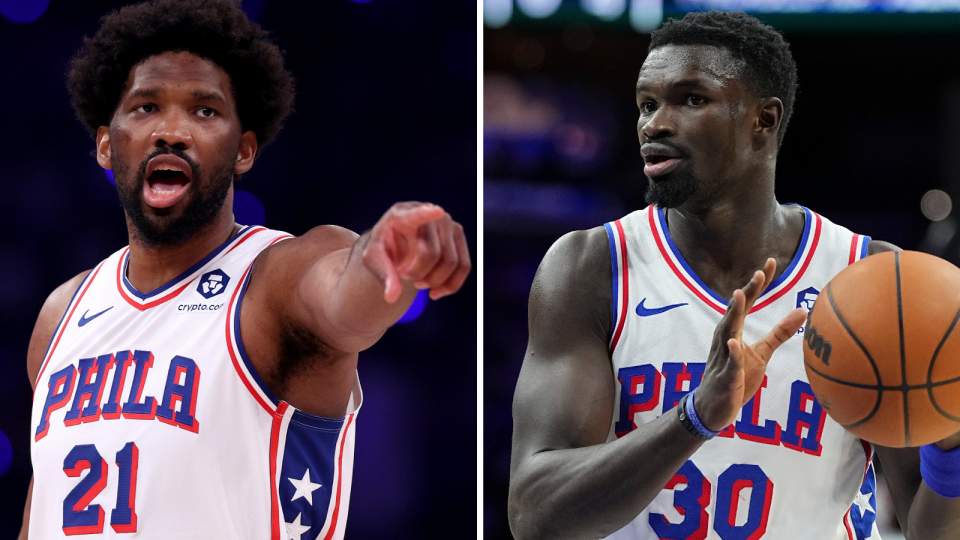Nigeria’s Hakeem Olajuwon opened the doors for Africans in the National Basketball Association (NBA) four decades ago and three more young centers with ties to the continent are set to follow his lead this season.
Cameroon international Ulrich Chomche was the youngest player selected June’s NBA Draft while Yves Missi also grew up in the Central African nation and Adem Bona was born in Lagos, Nigeria.
The trio, on the rosters of the Toronto Raptors, New Orleans Pelicans and Philadelphia 76ers respectively, joins about 10% of current NBA players who were either born in Africa or have one parent who was born on the continent.
“You see an incredible amount of talent coming out of the continent,” NBA deputy commissioner Mark Tatum told BBC Sport Africa.
“Two of the last three Most Valuable Players were Joel Embiid, from Cameroon, and Giannis Antetokounmpo, who has Nigerian roots.
“Victor Wembanyama, the number one draft pick and the Rookie of the Year this past year, again, has African roots.”
As the 2024-25 season approaches, five-time NBA champion Derek Fisher believes Embiid, who chose to represent the United Statescould help the 76ers win their first title since 1983.
“Joel talked about wanting to stay healthy specifically for the NBA playoffs,” Fisher told BBC Sport Africa.
“We’ve never seen Joel healthy in the playoffs before. If that happens, I do think that makes the 76ers a team to watch in the Eastern Conference.”
Eyes on Celtics and James family
Fisher, who won all of his titles with the LA Lakers in a career spanning 18 years, believes so defending champions Boston Celtics is still the team to beat.
“There’s no reason to believe the Celtics don’t have a great chance to get out of the East again,” he said.
“I think the 76ers will challenge them.
“In the West I think it’s more of a toss-up. There are so many great teams it’s hard to pick one.
“I would say you should watch out for the Oklahoma City Thunder. And I think the Denver Nuggets could be back at the top.”
Beyond the competitive landscape, Fisher is captivated by the story of LeBron and Bronny James, the historic first active father-son duo in NBA historyand what it means for the development of future talent.
“LeBron and Bronny are two separate individuals, but obviously share one name, so it’s exciting,” the former point guard said.
“I know we see it through the lens of basketball, but I think we have to take a bigger view of it as men who have sons or a young man in our life, whatever business or industry we’re in.
“If we had the opportunity to build something for over 20 years and then open the door or drop the ladder to bring them in, that sets the example for many.
“What we’re all trying to do basically [is] drop the ladder so that those coming tomorrow will have greater access and opportunities.”
Development of talent
Fisher also helps future basketball players in his own way, and the 50-year-old recently ran a clinic in Kenya to share his love of the game.
“I think it’s important not only to export talent to other places, but also to make sure we develop young talent right on the continent,” he said.
“Every great player doesn’t necessarily have to go away to be seen.”
Fisher spent an afternoon with a group of 80 young people and coaches from different schools across Nairobi at the invitation of NBA Africa.
“It’s so important to show young people that we care. For me, specifically, [it is] through the game of basketball. This is where it starts.”
For many of the youngsters involved, the NBA-backed Basketball Africa League (BAL) is one of the avenues where they can showcase their talent.
“There are only 450 jobs in the NBA, but there is so much talent on the continent that we think we can create a thriving league on the continent of African players,” Tatum said.
Growing the BAL
The BAL is in its fourth year but has yet to make a profit despite growing attendances and media visibility.
Clare Akamanzi of NBA Africa, who was appointed as chief executive last December, is not worried about the bottom line.
“With BAL, we are exactly where we hoped to be when we started four years ago,” she told BBC Sport Africa.
“The measure of success for us is one, to be known as a league. The second is getting more countries to participate.
“We have more than 25 countries that participate in the road to BAL. What we have seen is that countries have been inspired to start teams. The Central African Republic is one of those countries.”
Akamanzi says the BAL “will make money”, but that developing at the right pace is important.
“Do we expect to make money? Obviously, this is a business,” she added.
“But we are in the fourth year and we expect to be here, investing in all the things to grow in a sustainable way for a long time. We know that the game of basketball will only grow.”
Part of the NBA’s investment in Africa includes building 1,000 basketball courts across the continent in the next decade, including 100 in Kenya.
The aim is to provide adequate facilities – and equal opportunities for girls.
“Every clinic we have, we make sure there is parity – 50% girls, 50% boys,” Akamanzi said.
“We see that potential, and that potential for us will mean we’ll have girls playing basketball professionally as well.”


